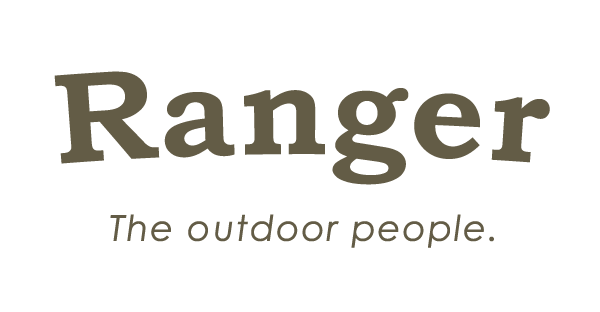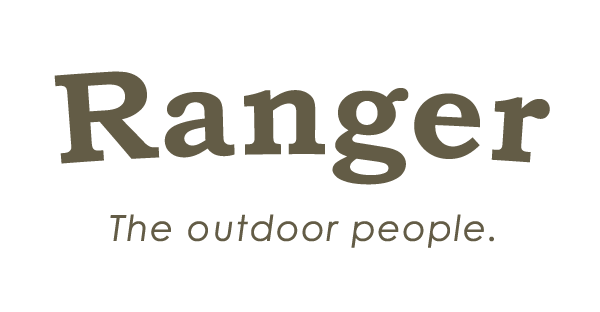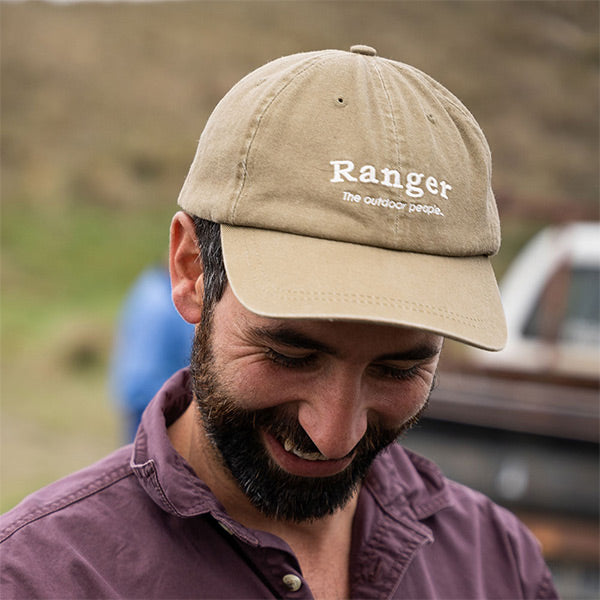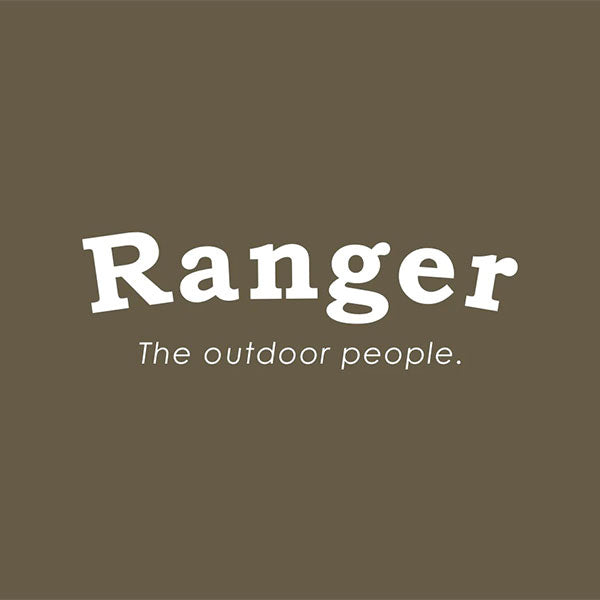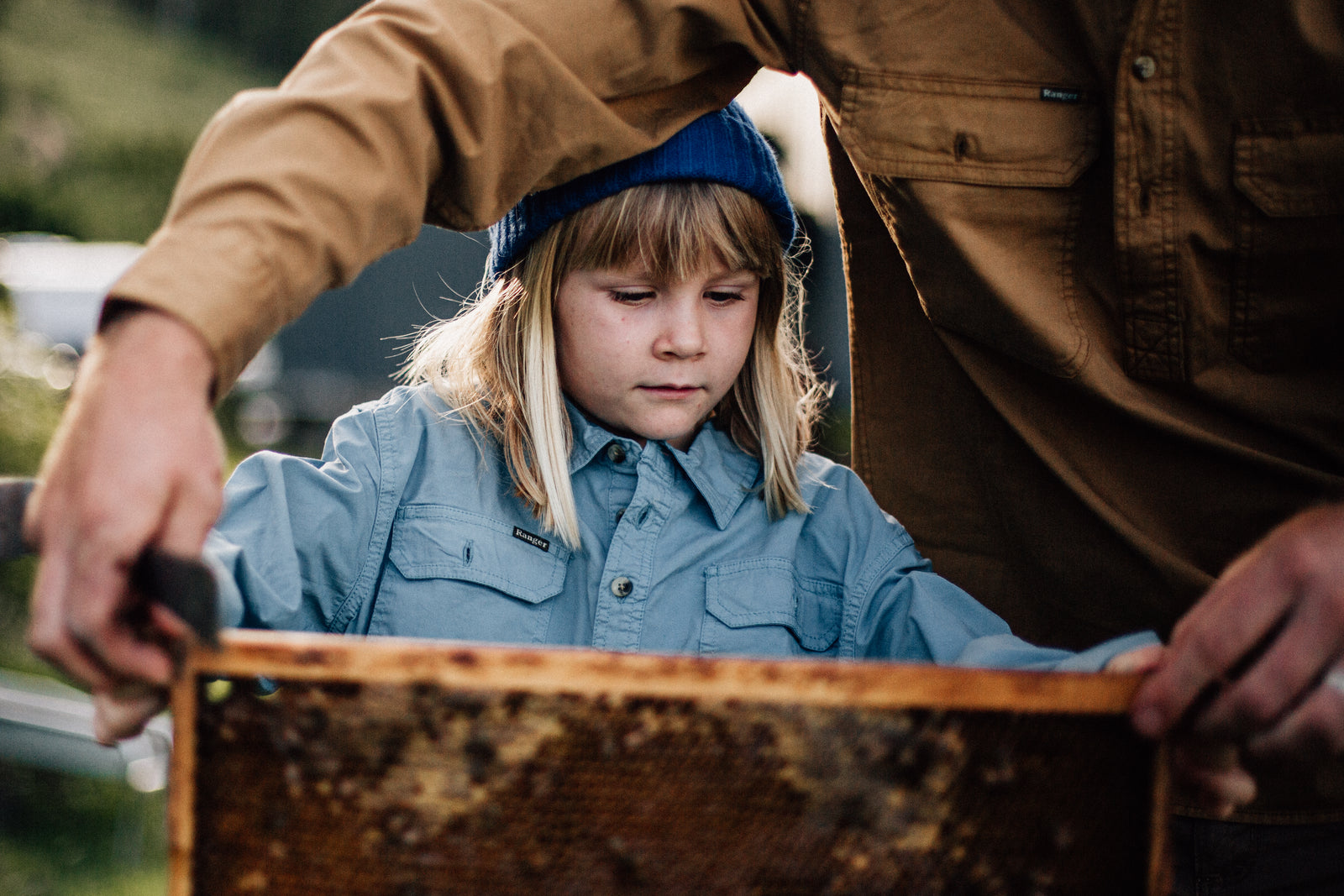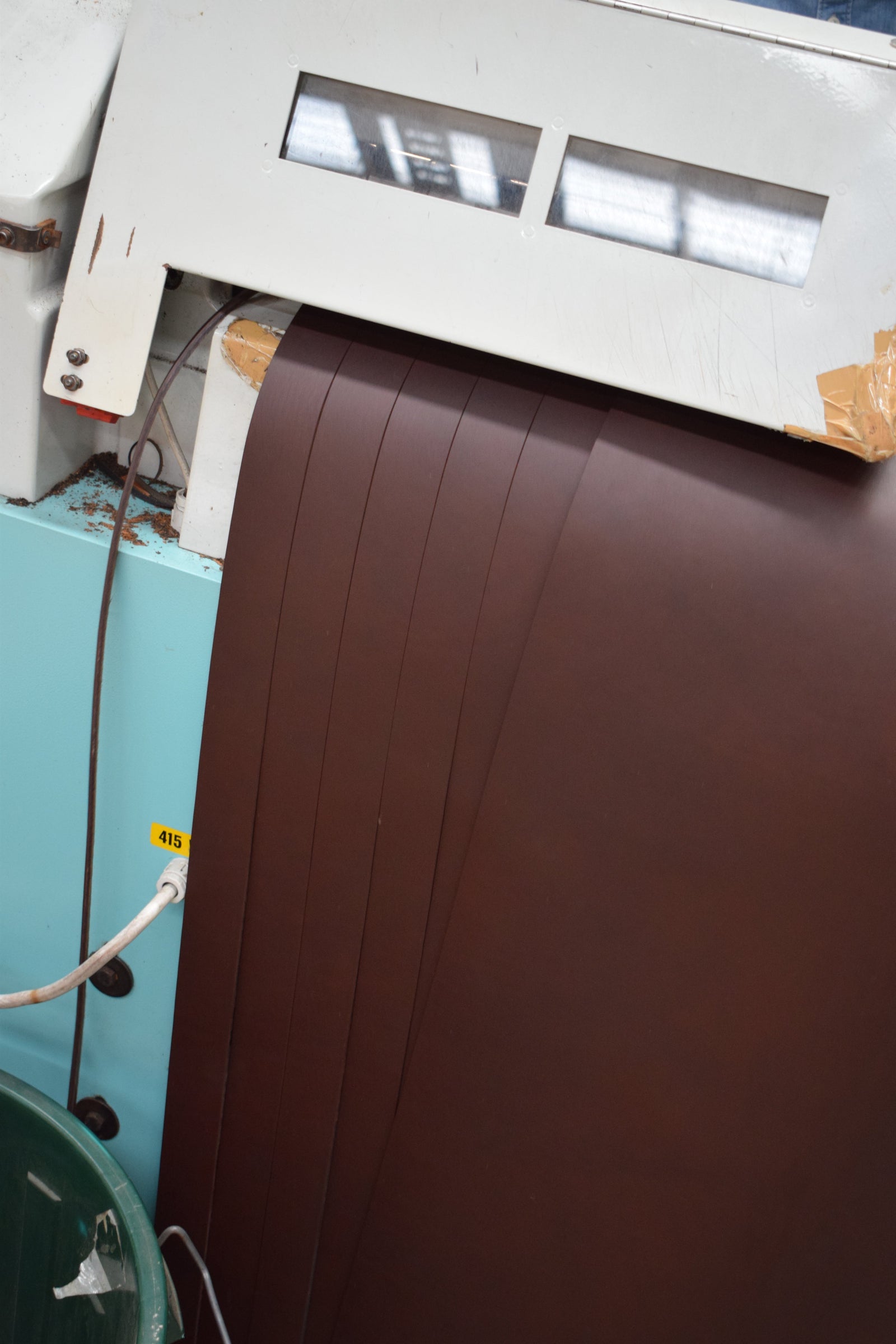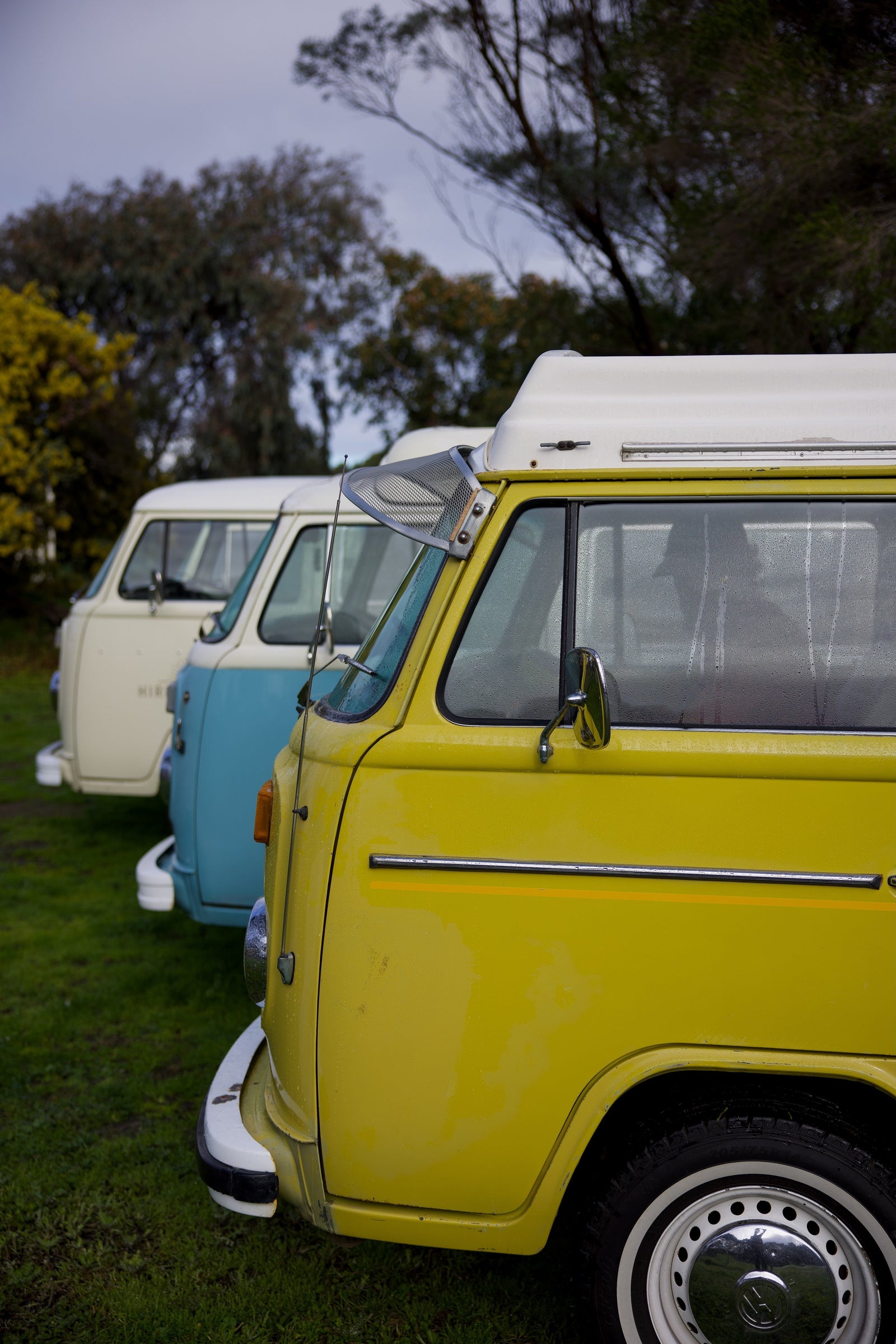
Although the popularity of backyard beekeeping soared during the pandemic, Roger and Hayley Mason had been fascinated with the practice long before it became mainstream. Despite their passion for bees, for a whole host of reasons the duo behind Settler Hives consciously decided against becoming commercial beekeepers. Rather, they wanted to create a business that could help feed and raise awareness for their little stripey friends. The Masons tell us how they’ve created an income stream selling something they’re passionate about and that continues to align with a lifestyle where ‘having less actually means having more’.
It’s a good thing Hayley and Roger Mason love the outdoors. The couple, along with their young daughters Scarlett, seven, Flora, three, and Lake, one, live in a tiny cabin on a property near the small town of Burringbar in the NSW Northern Rivers region, and spend most of their time living outside. And they say they wouldn’t have it any other way.
“We’re sunrise and sunset people”, Hayley says. “We watch them both from our cabin every day. The square meterage of our house is so tiny. We don’t have an oven so we just cook on the barbecue - we even bake cakes in it. We eat outside too. We love living amongst the cicadas and bandicoots and goannas and listening to the kookaburras say goodnight every evening.”

It was this wonder and appreciation for the natural world and the rhythms of the seasons that led the Masons to forge their own career path. Hayley and Roger, the enterprising duo behind Settler Hives, sell packets filled with flower seeds sourced from the best seed houses in the world as well as organic beeswax birthday candles and their own pure honey.
The couple’s business is driven by a few key values that underpin their life. Firstly, their love of bees. After developing a fascination with honey bees and becoming backyard beekeepers while living in Canada, the pair started documenting their learnings - and failings - on Instagram for family and friends to follow along. The popularity of the account increased and when they were living back in Australia, rather than becoming commercial beekeepers – which they say would involve “a whole lot of kilometres, heaps of time and a tolerance for high losses” – they brainstormed ideas for a business they could operate together that somehow involved bees. A little ‘seed’ of an idea to “sell seeds to feed the bees” popped into Hayley’s head one day. It has since evolved from hand-counting seeds into packets on their kitchen table at night after working other jobs, to generating enough income to create the life they had dreamt about and only work for themselves.
Hayley, thirty-six, and Roger, thirty-five, grew up in the same suburb in Brisbane, met when they were teenagers and got married when they were twenty-one and twenty respectively. Although not all couples are suited to working together, the Masons say it’s something they’re incredibly passionate about.
“That’s one of the best things about what we do”, Hayley says. “We always used to chat over coffee or beers about what we could do to set up a lifestyle where we could work at home together instead of per cent of the week being away from our home and each other working big hours for other people, then being exhausted at home during the evenings and on weekends. Not that it’s perfect working together all the time, we definitely have differences of opinion but we talk it out. We’ve gone through so many different seasons of life together. We constantly think about how to keep making choices that get us closer to the life we want. We’re really great at working hard together and then resting and enjoying what we’ve created.”

Another value that underpins the couple’s business choices is their desire to live a simple, pared back life where having less actually means having more. Two-and-a-half years ago they sold their quaint Queenslander in Toowoomba and made the move to the Northern Rivers. Their house sale meant they were in a position to buy a seed-packaging machine which totally changed-up their business model. For now, they’re more than happy to continue renting the humble cabin they live in.
“For us, it’s not about building a business as big as possible, it’s about building a life that’s as big as possible”, Hayley explains. “That means we manage how big the business grows. We home school our girls so they have our 100% attention at the moment. We’re big believers in ‘seasons’ of life and this is just the season we’re in now. We want to earn enough income but still spend as much time as we can with our girls.”
Another bonus of Roger and Hayley’s lifestyle is their ability to continue having their own backyard hives, which is where the whole Settler Hives journey began. “We’ve got four backyard hives. The honey is for our own use but we do sell some at local markets when we have enough. We also raise our own Guinea fowls too. We’re constantly in the garden, planting, mulching and composting. We also really love watching birds, so we’ve got the binoculars and the books and have been documenting the micro-seasons of the birds. By spending so much time outside, you’re much more awake to the seasons.”
Despite their conscious decision to keep their business a manageable size, Settler Hives seeds are sold via their website and at more than a hundred select retailers around Australia. Roger and Hayley also sell their seeds, and their own honey, at markets in their local area. A long-held dream for the couple to make all Settler Hives packaging home-compostable has recently been realised. “We’re so proud that all our packaging is now home-compostable. Now, everything comes from the earth and can go back into the earth. And it’s been carefully considered to preserve the life of its precious cargo, keeping it tucked in safely for at least two years without exposure to the elements - moisture, light and heat. After experimenting with growing our range to over 60 products, we’ve now pared it right back to a concentrated range but, really importantly, one where you can still have something growing year-round.”

NSW Department of Primary Industries figures show that due to the boom in backyard beekeeping as a hobby through the pandemic, there was an almost 100% in- crease in registered beekeepers in the four years to late 2023. Hayley and Roger often find themselves fielding questions from curious amateur beekeepers via social media. “We really encourage people to get involved with their local beekeeper organisations”, Hayley says. “They usually meet monthly and are a wealth of knowledge for anyone wanting to get started. The beekeepers in our club are 60-plus, hilarious and super nice. Other than that, we’d say to hold off on buying your honey bees until you’ve spent some time learning about them. There are so many diseases in Australia that can quickly move from one hive to the next, devastating colonies along the way. It’s a responsibility to manage them to thrive – it’s not just about collecting the liquid gold.”
“We also love when the people who follow us tell us they’re not scared of bees anymore. People write to us telling us about what they love about bees and how fascinated they are by them. If people aren’t able to have their own bees, we really encourage them to seek out their local beekeepers and buy pure, local honey direct from them.”
Roger and Hayley are an excellent example of people choosing to do life outside the big cities who place utmost importance on their way of life and doing something which supports the overall health and viability of our food-chain. You get the sense that the fact it also happens to earn them an income comes second place. “We can get so overwhelmed by the huge problems in the world and think it’s all beyond our control and there’s nothing we can do to help”, Hayley says. “But the simple act of growing food for bees is one small thing you can do that makes a really big difference. Planting flowers will help what food bees have access to, then they’ll pollinate one-third of the food that’s on your plate. Without bees, we don’t have food.”
Article by Alice Moffat Photography Indiana Chataway - As featured in @p.andaemonium www.pandaemonium.org
You can find Settler Hives here: @settlerhives www.settlerhives.com
